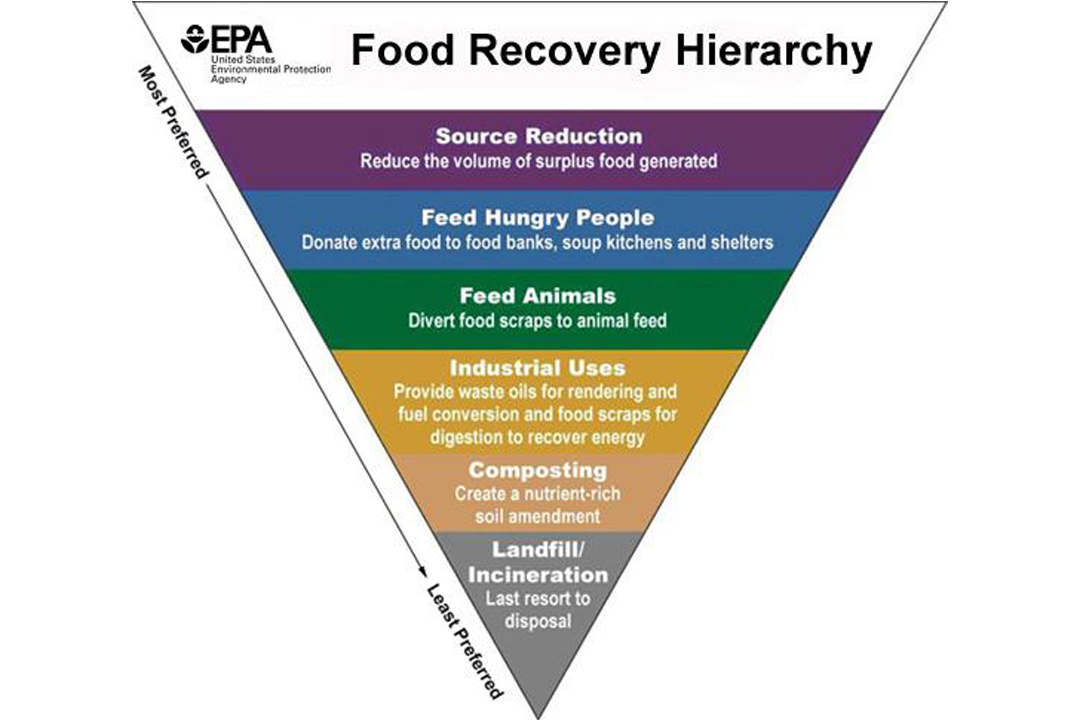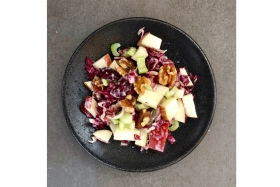
Reducing Food Waste in Foodservice
October 16, 2018 by Doreen Garelick, Dietetic Intern
Our intern Doreen attended a food waste summit for restaurants and compiled these tips to help food service operators redirect…
October 16, 2018

A recent study found that the average American wastes about one pound of food each day, which is equivalent to about 25% of all the food that’s produced in the country. This number only includes the weight of food wasted when people eat at home or dine out, and doesn’t even include food that’s wasted in agricultural practices or at supermarkets.
The U.S. Environmental Protection Agency developed a Food Recovery Hierarchy pictured above that includes practical steps (from most preferred to least preferred) restaurants can take to help reduce food waste. By putting some of these tips into action, restaurants can save money, reduce the impact of food waste on the environment, help feed the hungry and tell your customers about your environmentally responsible accomplishments.
Source Reduction helps avoid the initial creation of food waste. This step can be carried out by first putting a food purchasing policy in place for your restaurant. It can include practices like identifying frequently over-purchased food items, purchasing pre-cut food to reduce prep waste and using a purchasing system that only orders the types of food that are needed, when they are needed. Restaurants can also review their storage practices to ensure that food is being stored properly to reduce premature spoilage and that older products are being used first.
It’s also helpful to re-purpose food, like using vegetable trimmings to make stock, leftover fruit to make smoothies and day-old bread to make croutons or bread crumbs. Although restaurant managers have to lead the food waste reduction initiative, the restaurant staff has to be well-informed and enthusiastic to make the goals a reality. Training new and existing staff on food waste reduction practices, posting signs in the kitchen and creating incentives to encourage participation are all effective ways to help employees cut back on waste.
Feed Hungry People excess food that’s still safe to eat. There are many food banks and food recovery groups that will gladly accept non-perishable and unspoiled perishable food from your restaurant. Many establishments have legal concerns about food donations but there’s no real reason to worry. If food donations are made in good faith and without gross negligence, a U.S. good Samaritan law shields donors from liability if any of the donated products unintentionally cause harm to a person who receives them. Donating your restaurant’s unused food will also generate tax deductions for your business and help reduce your waste disposal costs.
With the EPA’s third food recovery step, you can help Feed Animals by sending selected fruit, vegetable and grain wastes to local farms. In addition to a web search for nearby animal farmers, your county or state agricultural departments or departments of health should be able to give you some contact information.
Some other ways that restaurants can reduce food waste are arranging for an industrial biodiesel manufacturer to collect the fats and oils that are left over after food preparation, and composting food scraps to create nutrient-rich plant fertilizer. Your restaurant can share all the feel-good benefits of reducing food waste with your customers and accountant by not allowing your scraps and leftovers to end up in a landfill.
References
Conrad Z, Niles MT, Neher DA, Roy ED, Tichenor NE, Jahns L (2018) Relationship between food waste, diet quality, and environmental sustainability. PLoS ONE 13(4): e0195405. Available at: https://doi.org/10.1371/journal.pone.0195405
Nutrition 101

Nutrition 101
September 26, 2018 by Doreen Garelick, Dietetic Intern
Ever notice headlines about rapid weightloss? Dietetic Intern Doreen Garelick looks deeper into a recent eye-catching headline to see if there's any truth behind it.
Recipes

Recipes
September 19, 2018 by Doreen Garelick, Dietetic Intern
Inspired by the changing seasons, Dietetic Intern Doreen Garelick created this fall-inspired Waldorf Salad with a light Greek yogurt dressing.
Connect
 Follow us on Twitter
Follow us on Twitter Friend us on Facebook
Friend us on Facebook Follow us on Pinterest
Follow us on Pinterest Follow us on Instagram
Follow us on Instagram Read our Blog
Read our Blog Watch videos on YouTube
Watch videos on YouTube Watch videos on Vimeo
Watch videos on Vimeo Connect with us on Linkedin
Connect with us on Linkedin Find us on Foursquare
Find us on Foursquare
Tweets by @SPEcertifiedBlog Search
Categories
SPE Certified Newsletter
Sign up for news on the latest SPE-certified venues, events and SPE updates.
We will never share your personal information with a third party.